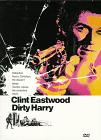
Dirty Harry (1972)

There is a book named From Caligari to Hitler that tries to penetrate the German national subconscious by analyzing German films between 1919 and the rise of the Nazis. If anybody is writing a book about the rise of fascism in America, they ought to have a look at Dirty Harry. The film is directed by Don Siegel, and it considers the role of a cop in society with lots of dynamite action and enough wry cynicism to keep the blood from getting too thick. It is photographed all over San Francisco, and is filled with good character actors. The presence of Eastwood in an action role is enough to explain the movie's popularity, but when you see it you discover that the movie has a message with a vengeance.
It is loosely based on 1970's headlines, and makes Eastwood a cop who is assigned to find a mysterious killer named Scorpio. The killer has kidnapped and killed various girls, he has tried to extract $200,000 ransom from the city, and in the film's climax he hijacks a school bus. The gimmick is that Eastwood is so filled with hatred for Scorpio that he violates the poor fiend's civil rights. While attempting to find out where a kidnapped girl is, for example, Eastwood gets no less than four amendments wrong. And so the city has to set Scorpio free—even though they have a murder weapon and a confession. Eastwood doesn't care; he says to hell with the Bill of Rights and stalks out of the district attorney's office.
When Scorpio hijacks the school bus, it is Eastwood again, who is asked to be bag man and carry the ransom. This time he refuses. He wants Scorpio on his own. We've already seen him twisting Scorpio's broken arm ("I have a right to a lawyer!" Scorpio shouts), and soon we will see him kill Scorpio in cold blood. Then, in a thoughtful final scene, Eastwood takes his police badge and throws it into a gravel pit. It is possible to see the movie as just another extension of Eastwood's basic screen character: He is always the quiet one with the painfully bottled-up capacity for violence, the savage forced to follow the rules of society. This time, by breaking loose, he did what he was always about to do in his earlier films. If that is all, then the film is a very good example of the cops-and-killers genre, and Siegel proves once again that he understands the Eastwood mystique. But the movie clearly and unmistakably gives us a character who understands the Bill of Rights, understands his legal responsibility as a police officer, and nevertheless takes retribution into his own hands. Sure, Scorpio is portrayed as the most vicious, perverted, warped monster we can imagine—but that's part of the same stacked deck. The movie's moral position is fascist. No doubt about it. I think films are more often a mirror of society than an agent of change, and that when we blame the movies for the evils around us we are getting things backward. Diorty Harry is very effective at the level of a thriller. At another level, it uses the most potent star presence in American movies—Clint Eastwood—to lay things on the line. If there aren't mentalities like Dirty Harry's at loose in the land, then the movie is irrelevant. If there are, we should not blame the bearer of the bad news.
PERFORMER, CHARACTER
Clint Eastwood, Harry Callahan
Reni Santoni, Chico
Harry Guardino, Bressler
Andy Robinson, Scorpio
John Mitchum, DeGeorgio
John Larch, Chief
John Vernon, Mayor
Mae Mercer, Mrs. Russell
PRODUCTION CREDITS:
Producer, Don Siegel
Directo,r Don Siegel
Screenwriters, Harry Julian Fink, Rita M. Fink, and Dean Riesner
Editor, Carl Pingitore
Cinematographer, Bruce Surtees
Composer, Lalo Schifrin